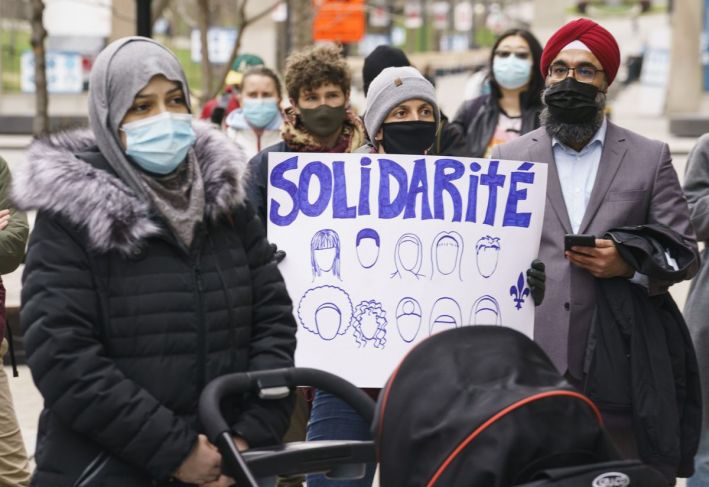Alexis de Tocqueville described the tyranny of the majority as a decision "which bases its claim to rule upon numbers, not upon rightness or excellence".
The Canadian province of Quebec’s Bill 21, initially passed in 2019, bars government employed public servants like teachers and lawyers from wearing religious symbols such as yarmulkas, crosses, turbans and hijabs at work. A Grade 3 teacher who wears a hijab was recently removed from her classroom role at her Quebec school because of the law.
In my view, this law is wrong.
Supporters of the law claim that a solid majority of Quebecers support it, that it ostensibly aims at ensuring that Quebec remain a “secular” state.
In the view of 65% of Quebecers, the Catholic Church’s 400-year hold on political and social power in the province that ended in the 1960’s is reason enough to ensure that state and religion are permanently and completely separated.
I agree.
But does what someone wears to work create a situation of support by the government of a certain religion?
Is the majority always right?
Many observers believe that the law is, in its essence, an anti-Islamic law aimed at curtailing the obvious presence of Muslims in Quebec society.
As a French speaking region of North America, Quebec has for many years promoted the immigration of French-speaking people to its shores. Many of the immigrants are Muslims from French Africa. Hence the anti-Muslim racism growing in many parts of the province as well as in other provinces. As well, anti-Semitism has long been a social factor in Quebec, so the ban on yarmulkas is also welcome in certain circles of society but disturbing for the large majority of Quebecers.
The banning of Christian symbols means that teachers and other civil servants cannot wear crosses or other religious symbols during working hours. Indeed, the crosses that for centuries hung in the provincial legislature and Montreal’s City Hall were removed when this bill was passed.
Interestingly, the banning of turbans means that the Sikh ministers currently serving in the Federal Cabinet would not be eligible to be elected to the provincial legislature or serve in the provincial government.
Although it was passed democratically, this law goes against the Canadian Charter of rights and freedoms.
Currently, citizens groups are suing the provincial government for going against the Bill of Rights by depriving people of their right to free expression.
Federal political leaders argue that, since the case is before the courts, they cannot intervene, although to various degrees they have come out against the law.
However, the main reason for their lack of action may well be their fear of losing valuable seats in Quebec should they pursue an attack on the Quebec government.
Quebec has 78 seats in the 338 seat Canadian House of Commons – a rich treasure trove for parties seeking to form a majority government.
So, it comes down to whether the majority can run roughshod over minorities for political gain.
Given Quebecers’ massive opposition to outside interference in their affairs, one might ask whether the Canadian Federal Government is right in not interfering while Quebecers themselves are fighting the law in the courts.
As well, interference at this stage might reignite the currently moribund separatist movement and launch Canada once again into a constitutional debate that could imperil the federation.
Thus, Canadian Prime Minister Trudeau has found himself between a rock and a hard place. He has spoken forcefully against the law but is also taking into consideration the unity of the country – a unity that came close to disintegrating in 1995 when federalist forces won the referendum on independence by less than 1%. But by not acting, however, he has put the validity of the Bill of Rights in question and has left most Canadians demanding better.
I hope that, should the current court case fail, that the federal parliament will formally address this issue and that the federal government will take the Quebec government to task for going against the Bill of Rights.
This law, although passed democratically, is morally and ethically wrong. The tyranny of the majority cannot prevail in a civilized society when the rights of the minority are fundamentally attacked and curtailed.
Canadians will be right to question the leadership and commitment of the federal government to the rule of law and equal rights for all should the Federal Government not take a principled stand and fight this law should the verdict of the courts in this current litigation prove ineffective.
Keep reading: After Putin?
Edición: Laura Espejo
Nube de gas envolvió la carretera previo al fuego; reportan 17 heridos
The Independent
El italiano Jonathan Milan se impuso con un tiempo de 4:03.06
Ap
Se trata de Coco Gauff, Amanda Anisimova, Jessica Pegula y Elina Svitolina
La Jornada
La cantante Colombiana también estará el Estadio GNP Seguros el 27 de febrero
La Jornada
